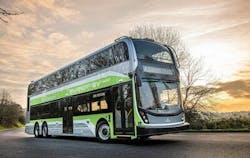Sound Transit to utilize wireless charging along Stride BRT corridor
Sound Transit will soon be deploying InductEV's wireless charging technology for Seattle, Wash.,'s new Stride bus rapid transit (BRT) service. The procurement includes 48 wirelessly charging electric buses, including 33 double-deckers from Alexander Dennis, a subsidiary of NFI Group Inc.
Seattle will be the first location in North America to deploy double-decker electric buses with inductive wireless charging.
The 33 zero-emission Alexander Dennis Enviro500EV double-decker electric buses will make Sound Transit the seventh transit agency in Washington State to deploy InductEV's patented wireless charging technology.
The company's technology is currently in use or scheduled for deployment in approximately 100 electric buses throughout the state, along with 35 InductEV in-ground wireless charging pads.
InductEV's technology avoids wired, depot-oriented charging methods that consume considerable real estate and electric utility assets while allowing smooth, high-powered wireless charging interoperability for both double-decker and 60' articulated electric buses on BRT high-end commuter routes.
"The inclusion of Alexander Dennis marks an exciting new chapter for InductEV," said Brandon Anulewicz, chief revenue officer for InductEV. "Together, we'll grow the company's existing footprint and, by so doing, accelerate the benefits of wireless inductive charging technology in the commercial and municipal transport sectors."
Daytime on-route wireless charging also enhances the use of renewable energy for electricity versus in-depot wired charging at night. Sound Transit will charge its buses on-route and in depots since nearly half of the electricity in the Puget Sound region comes from renewables.
"It's about more than just buses. It's about transforming communities, reducing emissions and creating greener, more efficient transportation systems," Anulewicz said. "We continue to work closely with local agencies to facilitate the expansion of statewide wireless networks, connecting Washington communities and spearheading sustainable transportation solutions."
